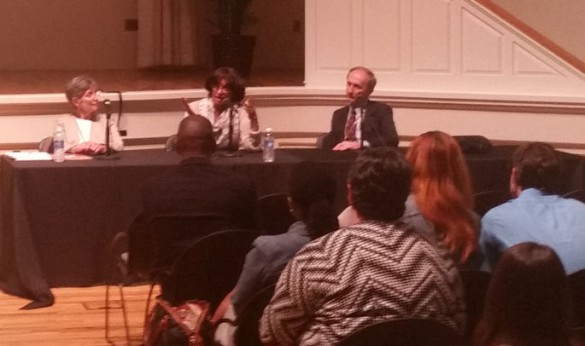
by Jane Sevier
Abolitionist and social reformer Frederick Douglass once said, “It is easier to build strong children than to repair broken men.” Creating positive, safe school environments where effective teaching and learning can take place is one way to ensure strong children, but many schools still struggle to do so.
At the Peabody Research Institute’s annual mini-conference on April 2, three leading educational researchers in the field of school behavior addressed different aspects of misbehavior in schools and its effect on education. The confernence convened at the Wyatt Center at Vanderbilt Peabody College of education and human development.
Sandra Graham, professor of education at the University of California–Los Angeles, discussed bullying and how the racial context of schools influences peer interaction. As the United States becomes a nation of racial minorities, she said, public schools will be the first social institutions not to have racial and ethnic majorities. Diversity in school populations means a greater balance of power, reducing bullying, which relies on intimidation, and an imbalance of power.
Graham also discussed attribution theory—how and why people explain events—as it applies to a child’s response to bullying. A child who believes he or she is to blame for being bullied may lose the self-esteem necessary to succeed in life.
Denise Gottfredson, professor of criminology and criminal justice at the University of Maryland, focused on aspects of school climate such as teacher and administrator engagement and understanding of children’s behaviors at school. She argued that climate is to a school as personality is to an individual and that a school’s student-teacher ratio, sense of community and discipline management affect its climate.
She also asked if a school can change its climate to reduce bullying. Gottfredson cited programs like Project PATHE (Positive Action Through Holistic Education) and those available through the Technical Assistance Center on Positive Behavioral Interventions and Supports (PBIS) as offering methods for such change.
Joe Durlak, emeritus professor of psychology at Loyola University of Chicago, highlighted different programs shown to improve students’ understanding of appropriate behavior and the strategies those programs used to enact change. He advocated developing children’s strengths and competencies, stressing that skills must be taught and that more skills can mean fewer problems, and providing training and development for school staff.
Durlak is co-author of a review of 59 school-based social and emotional learning (SEL) programs involving more than 59,000 students that indicated that SEL programs affect not only social cognitions and behavioral adaptation but that such programs substantially influence academic achievement. He directed the audience to the Collaborative for Academic, Social, and Emotional Learning for more information on SEL.
The mission of the Peabody Research Institute is to conduct research aimed at improving the effectiveness of programs for children, youth and families. Each year, PRI hosts a mini-conference that brings together leading minds in educational research to discuss critical research questions.